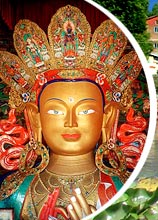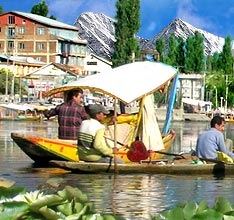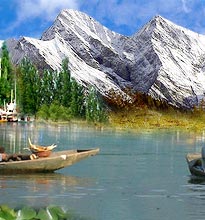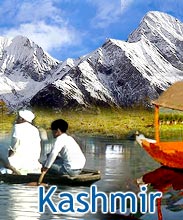 The
handmade carpets of Kashmir are famous throughout the world. Though
quite expensive, Kashmiri carpets are a worthwhile lifelong investment.
Apart from being always handmade, another quality of Kashmir carpets is
that they are always knotted, never tufted. The craft of carpet weaving
did not originate in Kashmir, rather it is believed to have been
acquired from Persia. The designs on the carpets, even today, reflect a
Persian touch. One of the most common designs seen on carpets of Kashmir
is that of the "tree of life". These carpets are quite unique
in themselves, differentiated from others by their color-way (subtle)
and other details.
The
handmade carpets of Kashmir are famous throughout the world. Though
quite expensive, Kashmiri carpets are a worthwhile lifelong investment.
Apart from being always handmade, another quality of Kashmir carpets is
that they are always knotted, never tufted. The craft of carpet weaving
did not originate in Kashmir, rather it is believed to have been
acquired from Persia. The designs on the carpets, even today, reflect a
Persian touch. One of the most common designs seen on carpets of Kashmir
is that of the "tree of life". These carpets are quite unique
in themselves, differentiated from others by their color-way (subtle)
and other details.The durability as well as the price of a carpet depends upon it's knotting. The more knots per square inch, the higher will be the carpet's price as well as durability. The knots are counted on the reverse side of the carpet. Also, there are both single and double-knotted carpets. You can quite easily identify one from the other on the reverse of the carpet. A single knotted carpet is fluffier and more resistant to the touch than the double knotted one.
The yarn used for carpets in Kashmir is generally silk, wool or a combination of silk and wool. The woolen carpets always make use of a cotton base for both warp & weft. On the other hand, the silk carpets usually have a cotton base. In case a base of silk is used, the price of the carpets increases accordingly. Occasionally, a cotton base, mainly of woolen pile with silk yarn, is used to make carpets. Another yarn staple used in carpet making is mercerized cotton. Although traditionally not Kashmiri, it is a man-made fiber with a shine somewhat close to that of silk. It is cheaper than silk, but costlier than wool.









